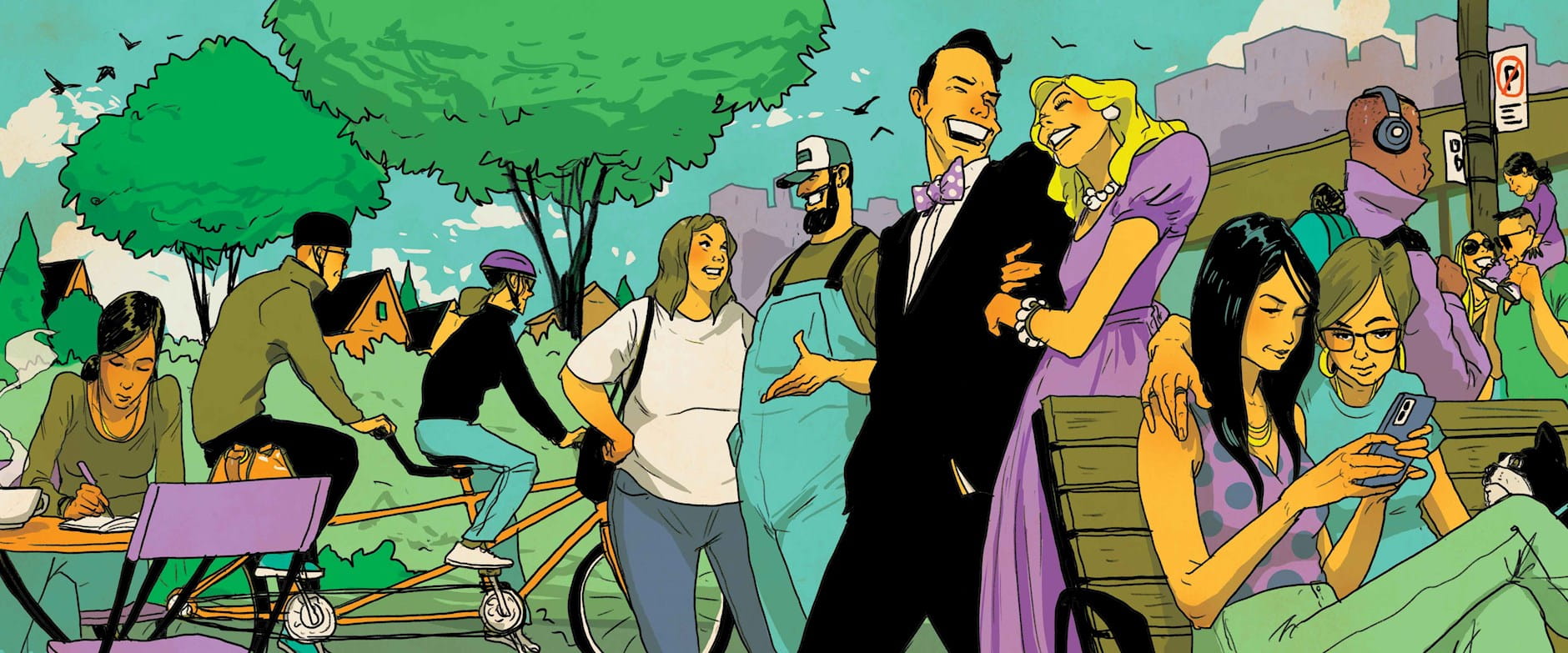Over the past half century, Americans overwhelmingly reported being happy, and the biggest factor in happiness was being married, according to Chicago Booth’s Sam Peltzman.
Those findings are based on his analysis of data from NORC at the University of Chicago’s General Social Survey spanning nearly 50 years. The survey has been asking adults in the United States about their happiness since 1972 and has turned up a consistent 70 percent/30 percent split between those who say they are “very happy” or “pretty happy” and those who say they are “not too happy,” Peltzman finds.
After the US entered the new millennium, there was a 4 percentage point dip in overall happiness, Peltzman finds. And yet, sadness didn’t spike. (Peltzman rescaled the survey answers and categorized people who reported being “not too happy” as sad.) Rather, a larger proportion of the population identified with feeling “pretty happy” rather than “very happy,” he says.
And although the percentage of married Americans has consistently declined since 1972 to barely 50 percent today, Peltzman finds that marriage is an unparalleled factor in happiness. Married people are persistently 30 percentage points happier than unmarried people, the data indicate.
However, Peltzman offers a note of caution. “You can’t infer what’s causing what,” he says. “Undoubtedly, it goes both ways. Happy people get married, and married people become happy. So don’t run out and make any personal decisions on the basis of this.”
Peltzman sliced the happiness data in several other ways along sociopolitical lines. His analysis challenges the idea that gender plays a role. Since 2000, men and women have been equally happy, he finds.
A factor that stands out
An analysis of a survey that asked Americans to what extent they were happy finds that married people were persistently 30 points happier than unmarried people, whose average scores hovered near zero.
There are caveats, of course. In recent years, women’s happiness has declined a little bit (and Peltzman emphasizes a little bit). But in the previous period, women’s happiness was rising compared with men’s. “My interpretation of this history is that gender is not an especially important category for studying happiness differences today,” he writes. In the big picture, he says, gender as a factor is “trivial compared with marriage or income.”
Race and income do seem to have a pronounced effect. Historically, white people have reported greater happiness than Black people. However, this gap appears to be shrinking as Black people began reporting increased happiness over recent years, and levels for white people fell.
A long-running, central question is: “Does money buy happiness?” On an individual level, it seems to, Peltzman finds. The data show a nearly linear relationship between higher household income and happiness. Since the 1970s, happiness among those in the top percentile of household income has remained flat, and happiness at the bottom has declined.
The survey asks people to rate their position on the political spectrum. Overall, in the entire sample studied, around a quarter identified as liberal, and the rest split roughly equally between moderate and conservative—proportions that haven’t changed over time. Peltzman finds that conservatives are 9 percentage points happier than liberals and 7 points happier than moderates. Those who said they trust the government are 18 percentage points happier than those who said they don’t, he finds.
Peltzman’s study demonstrates that while the general gauge depicts a largely contented population, happiness starts to differ when you dissect it by marriage, income, and other socioeconomic factors. In the face of all that, the age-old institution of marriage continues to hold its ground. Whether attributable to stability, companionship, or other factors, marriage’s role in shaping happiness remains undeniable.
Sam Peltzman, “The Socio Political Demography of Happiness,” Working paper, October 2023.
Your Privacy
We want to demonstrate our commitment to your privacy. Please review Chicago Booth's privacy notice, which provides information explaining how and why we collect particular information when you visit our website.
